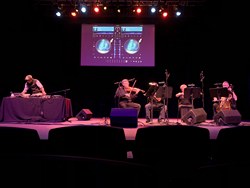A panel of Educational Opportunity Fund (EOF) students met last Tuesday morning with staff from Mt. Vernon Nazarene University (MVNU) in Ohio, in a collaborative effort to start a program that mirrors the University’s.
On November 2, 2010, EOF Director Colleen Johnson and Dean of the Center for Student Success, Dr. Mercy Azeke, traveled to Mobile, Alabama for the Sixth Annual National Symposium on Student Retention. There, Johnson presented a paper written by herself, Azeke, and history and anthropology professor Dr. Richard Veit, titled “Building for Success: A Model for Improving Retention and Building Diversity through the Educational Opportunity Fund.”
Also present at last November’s symposium, among representatives from numerous schools across the country, was John Ballenger, Director of Student Success at MVNU.
“Ballenger thought [Johnson’s] program would best suit [MVNU’s] needs, and he chose to reach out to Colleen,” said Albert Fure, a longtime math specialist for the University’s EOF department.
At the request of MVNU’s President Dr. Daniel Martin and inspired by the paper, Ballenger reached out to the University. Upon Ballenger’s request, Johnson made arrangements for him and Dr. Bradley Whitaker, professor of mathematics at MVNU, to visit the University and meet with EOF staff and students which took place last Monday.
In attendance were Provost Dr. Thomas Pearson, Azeke, Director of First Year Advising Debbie Kavourias, Vice President for Student & Community Services Mary Ann Nagy, Director of the Writing Center Jane DeTullio, Admission Counselor Andrew Amendola and Assistant Director of Financial Aid Robert Hennessey.
According to the Higher Education Student Assistance Authority (HESAA), EOF was created by law in 1968 to ensure meaningful access to higher education for those who come from backgrounds of economic disadvantage. It is a scholarship program that provides supplemental financial aid to help cover the cost of books, fees, tuition, room and board.
Every spring, the University’s EOF staff interviews over 100 eligible candidates, and only 40 of those interviewed receive admittance to the program. To be considered for the EOF program, students must first meet the University’s admission requirements and be a New Jersey resident for at least one year. Financial eligibility is dependent on the relationship between students’ families’ standard gross annual income and the number of dependents in the family ($21,600 for a one-dependent family; $74,000 for a family with eight dependents).
“When you are one of our EOF students, it is our job to make sure you graduate and continue to bring pride to this program, and we take that job very seriously,” Johnson said. “Students are held to a much higher level of responsibility.”
On Tuesday, Ballenger and Whitaker sat down with a panel of eight EOF student leaders who shared their thoughts and experiences about what EOF has come to mean in their lives.
“The University’s EOF program has given me the opportunity to experience so many things that I otherwise would not have been able to do,” said Michelle Malanga, a senior in EOF majoring in criminal justice. “With a similar program, MVNU’s financially disadvantaged students will be given the same priceless opportunities that come with access to higher education.”
Just as the President of MVNU supports the start of a similar program at his institution, Johnson explained that the University’s program’s prosperity is largely due to support from campus administrators.
“Our program’s success has a lot to do with the backing and encouragement of President Gaffney, Vice President Mary Anne Nagy and Provost Pearson,” Johnson said. “Of course, it is also up to the students that we select and how much those students give back to both the University and EOF communities.”
To date, over 80 percent of current EOF students are inducted into Chi Alpha Epsilon, the EOF National Honors Society, for maintaining a cumulative GPA of 3.0 or higher for at least two consecutive semesters. Johnson asserted that all EOF scholarship students are held to a higher level of expectation, responsibility and behavior.
First-year EOF students participate in a rigorous five-week, on-campus summer program that immerses them in campus life, academic diligence and real-life situations that serve as opportunities for personal growth. They are put under the constant supervision of four handpicked and specially trained peer counselors, as well as regular EOF staff. A typical day includes a highly-structured schedule with allotted times for meals, classes, seminars and study.
“I was a summer peer counselor for two years in a row, and we had strict rules we had to abide by,” said Balkees Parveen, a senior in EOF. “The program builds your character, teaches you how to be a leader on campus, and how to deal with real life situations. You learn to truly respect your peers and your education.”
Whitaker said that he and Ballenger were impressed by the success of the program and moved by the students’ resilience and stories of accomplishment, and they hope to have MVNU start a similar program beginning in the fall of 2012.
Due to lack of public funding from the state of Ohio, MVNU hopes to start small—with around 10 students next summer in anticipation of expanding their program to one day replicate the mission of the University’s EOF program on their campus.
Johnson has held every position in the EOF office over the past 30 years, including her current title of Director for 12 of those years. With over 150 students currently enrolled in EOF at the University, she recalled a time when EOF was only accepting 20 students every fall semester, but that number has since increased to 40 thanks to the University administration’s support and dedication to the EOF mission.
Johnson and the rest of the EOF community said that they are excited and hopeful for the success of MVNU’s developing program.
“I always say my favorite two days of the year are freshmen move-in day and the day those same freshmen walk across the stage at graduation,” Johnson said. “It is a gift to be invited in to someone’s life, and it is a joy to watch the kids transform from teenagers into responsible adults.”




